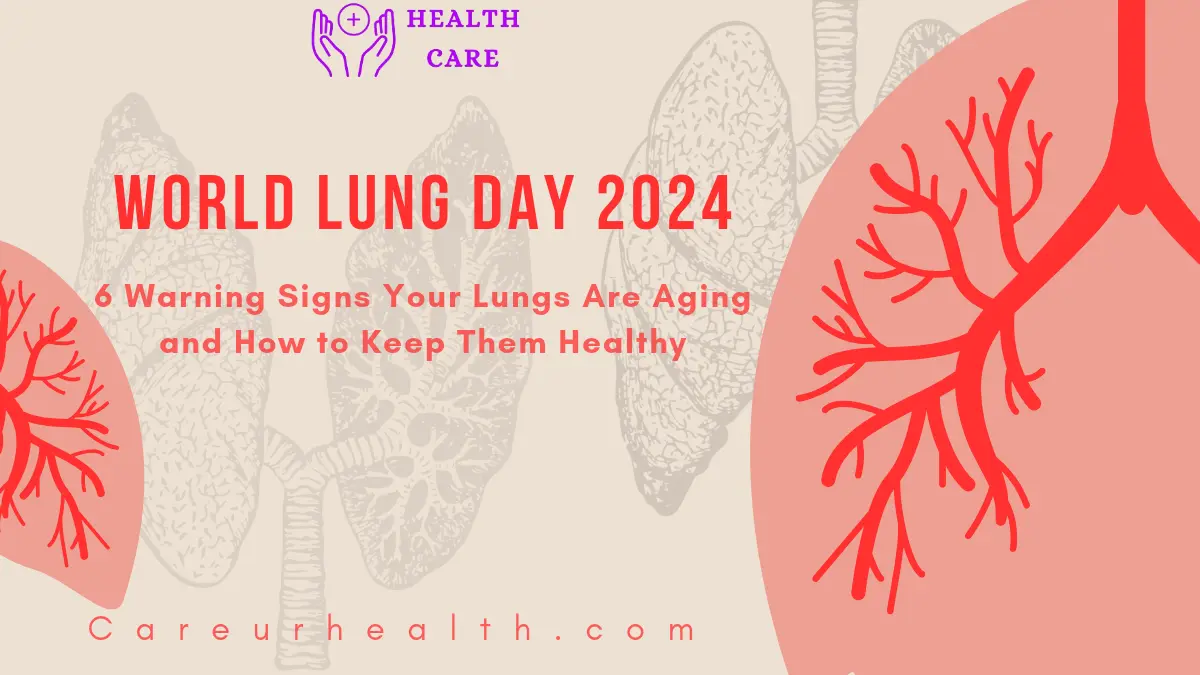As World Lung Day 2024 draws near, it is a good opportunity to think about how much we depend on lung health in our lives. Lungs bring oxygen into the body and, through exhalation, take carbon dioxide away. However, just like every other organ in our body, our lungs also age as we grow older. Awareness of these symptoms will help one maintain a good degree of respiratory wellbeing. The blog is going to talk about the six warning signs that prove you are ageing in your lungs and keep them healthy .
Basic Lung Health
Lung health is that critical aspect that can determine a throbbing life. Basic lung health includes the following:
- The lungs act as filters wherein pollutants from the air we breathe are removed.
- They oxygenate our blood-a prime necessity for any human function .
- Aging will, by its very nature affect lungs’ capacity and function that will further give rise to other health issues.
By knowing the importance of World Lung Day 2024 we can work towards enhancing our respiratory health. This reminds us to make it a point to take care of our lungs and be aware of these symptoms of ageing.
Early Warning Symptoms Your Lungs are Ageing
1. Breathlessness
One of the most obvious signs that your lungs may be moving into an ageing condition is shortness of breath. This symptom could be presented in the following ways:
- When you begin gasping for air at vigorous moments such as climbing stairs or just a walk.
- You start feeling winded after minimal efforts such as hauling groceries.
- Even when you lie down, you may feel shortness of breath.
“Shortness of breath could mean your lungs are not working the way they should.” Still, you need to see a doctor if this sign recurs or occurs many times.
What is Shortness of Breath?
There may be several reasons for shortness of breath. Some of them include:
- Chronic Obstructive Pulmonary Disease: This is the most common lung disease that leads to difficulties in breathing.
- Asthma: An underlying disease with wheezing and shortness of breath.
- Pulmonary fibrosis: Scarring within the lung tissue that progresses in time to damage the oxygen exchange.
Of course, awareness of the cause will lead you to make all the right decisions.
2. Chronic Cough
A cough that persists for weeks is another significant indication that you have old lungs. Consider the following factors.
- Chronic coughs may be caused by smoking or exposure to harmful pollutants which scar lung tissue.
- Mucus might develop during your advanced ages and cause you to cough.
- A cough may be louder in some than others, particularly in smokers or in a patient who, despite it being a one-time thing, had lung problems.
“A chronic cough could be indicative of some other disease which has to be treated by a doctor.” If your cough persists beyond weeks, then do not delay visiting the hospital.
Types of Coughs to be Aware of
There are several types of coughs. What kind of different cough will decide what other disease can be:
- Dry Cough: It could just be a sign of an allergy or asthma.
- Purulent cough: Sometimes occurs due to infections or chronic bronchitis.
- Haemoptysis: The patient must report for consultation because of this symptom.
Read More:-7 best exercise for joint pain: Easy To do
3. Poor Tolerance for Physical Exercise
Our lungs, like all other body parts, decline with age in their ability to function. To know, the following preemptive warning signs:
- Readily fatigued exercise previously tolerated.
- Decreasing to decreased endurance compared with previous years of life such that routine activities become more strenuous.
- Breathless or racing pulse with little or no exertion.
“Lung age can decline over time as tolerance to exercise does. Know when to dial it back and stay on the road to healthy lungs.”
Building Tolerance to Exercise
Some of the ways you may apply to enhance your tolerance to exercise:
- Gradually increase physical activity: Someone should start with short sessions and then expand time and intensity.
- Include breathing exercises: Practices such as diaphragmatic breathing can train and condition your lungs.
- Add aerobic activities: Walking, cycling, and swimming tend to increase an individual’s lung capacity at large.
4. Recurrent Respiratory Infections
Generally, elderly people tend to have repeated respiratory infections. Look out for these signs:
- You end up catching recurrent colds or flu all year round which may also imply that you have a lesser immune level.
- Sinus infections that fail to yield and give you continuing pains.
- You are more prone to getting pneumonia or bronchitis, especially after a cold or flu.
Frequent respiratory infections may indicate that your lungs cannot resist infection as you would want them to. Healthy lungs are important in fighting back against infections .
Prophylactic measures of Respiratory Infection
Protect your lung health and avoid infection:
- Fluid intake: Ensure you are taking enough fluids as this will keep the mucous membranes moist, trapping the incoming pathogen.
- Diet: Have a good store of vitamins C and D and antioxidants; these build immunity.
- Hygiene: Do not allow infection by handwashing; do not forget during flu season.
Changes in Lung Sounds
You can also be forewarned of lung ageing, though very severely in some cases through the following altered lung sounds:
- Continuous wheezing or whistling with each inspiration.
- Crackling or popping sounds when inhaling, particularly.
- Your normal breathing patterns grow fast and light.
“Lung sounds can be a symptom of many lung diseases.” If you do discover that you have such noises, schedule an appointment with your healthcare provider.
How to Interpret Lung Sounds What Lung Sounds Can Indicate
There are distinct lung sounds that may indicate the conditions below:
- Wheezing: Normally attributed to asthma or bronchitis.
- Crackles: Are suggestive of the presence of fluid in the lungs, possibly from pneumonia or heart failure.
Stridor is a high-pitched noise that could indicate an obstruction of the airway. Go to the doctor now.
6. Chest Pain or Discomfort
Chest pain or discomfort can be scary. Keep in mind the following:
- Pain that takes place with deep breathing or coughing may suggest inflamed lungs.
- Chest pain or tightness, especially in older adults, should not be taken lightly.
- Conversely, pain that has persisted with no sign of abating could be a symptom of some other serious disease.
“Chest pain can mean something serious related to the lungs or heart.” NEVER at any time ignore chest discomfort. Instead, rush to the hospital as timely medical evaluation may rule out some of the dangerous conditions.
Read More:-Exploring the Relationship Between Constipation and Chest Pain: Can constipation cause chest pain
Chest Pain Causes
Chest pain may be caused by one of the following factors:
- Muscle strain: This is mainly caused by engaging in some form of exercise or lifting weights
- Pneumonia or bronchitis: It may develop an inflammatory condition that would assist to bring on chest pain.
- Heart conditions: Chest pains may sometimes be indicative of heart conditions, which requires immediate treatment.

Ways to Keep Healthy Lungs
Healthy lungs require proper care, especially when one grows old. Some of the best tips for maintaining your lungs healthy and fully functional are described below:
1.Quit Smoking
Quitting smoking is considered to be one of the worst things you can do to harm your lung health. Here’s why:
- Smoking is the leading cause of lung damage and chronic respiratory diseases.
- Quitting smoking will greatly improve lung function with time, even for elderly individuals.
- Engage in counselling, medication, or quit-smoking programs if you want to quit.
Benefits of Quitting Smoking
- Healthy lungs: your lungs start healing themselves immediately if you quit.
- Reduced risk of getting lung diseases: COPD, lung cancer, or any other lung and respiratory disease.
- Overall Health: Quitting smoking improves your immune system, which fights the bacteria.
2. Be Physically Active
Physical fitness and proper lung function rely on regular exercise. And here’s how you can stay fit .
- Engage in 150 minutes of moderate physical activity weekly. Examples include brisk walking, swimming, or cycling.
- Exercises like yoga or tai chi enhance lung functions while helping breathe away stress.
- Strength training exercises also serve as a means through which you can keep your general muscular health fit and promote respiration.
Benefits of Regular Exercise
- Increase lung capacity: Regular exercise builds your body’s endurance to consume oxygen.
- Healthy heart: Exercise will ensure cardiovascular health intrinsically linked to lung health.
- Increased energy: Fit people avoid fatigue and generally feel good.
3. Healthy Diet
Eating right helps maintain lung health. Remember these dietary considerations:
- Integrate a variety of fruits and vegetables, which are rich sources of antioxidants, which will go a long way in helping against oxidative stress.
- Omega-3 fatty acids, in fatty fish, minimise the inflammation in the lungs.
- Fluid should always be high with plenty of water to lubricate the mucous membranes.
Healthy Foods for Healthy Lungs
- Berries: These are right for offering antioxidants that can help combat inflammation.
- Leafy Greens: The latter contain foods such as spinach and kale which avail a range of core vitamins and minerals for support towards healthy lungs.
- Nuts and seeds: These provide you with a healthy dosage of essential fats and nutrients that will keep your body well.
4. Good Hygiene
Good hygiene is one of the good things which can prevent enormous cases of respiratory infections. Some of the things you can do include:
- Ensure you keep washing your hands particularly in the cold and flu season in order to curtail instances of infection.
- Avoid those who are sick, especially during outbreaks of respiratory illnesses
- Get immunised regularly on shots like flu and pneumonia infection to prevent infections from happening.
Why Vaccinate?
The Vaccines are to be taken in order to help in:
- Lower severe illness: Vaccine injections will reduce the severity of the respiratory infections.
- Immunise others: As long as you keep yourself healthy, they will be protected as they are a vulnerable population.
- Build herd immunity: Mass vaccinations for the communities help in breaking the chain of transmission of respiratory diseases.
5. Monitor Air Quality
Air quality has an immediate impact on lung health of individuals, especially seniors. Here’s how you can monitor and improve air quality:
- Obtain notification concerning the local air quality levels through apps or websites.
- Spend less time outdoors especially during times when the air pollution levels are high.
- Use air cleaners indoors for the removal of allergens and pollutants.
Respiratory Therapy Zone
Importance of Clean Air
- Healthy functioning of the lungs: Reduced exposure to pollutants will lead to healthier lung functioning.
- Clean air and mental condition: Clean air is linked to a healthy mental condition and the entire quality of life.
- Decreased chances of diseases related to respiratory system: Reduced exposure to harmful substances will reduce the damage done to the lung.
While preparing for World Lung Day 2024, lung health becomes all the more relevant. The six symptoms that tell you that your lungs are ageing can equip you with the momentum to take proactive action and maintain healthy lungs over time.
Conclusion:
Remember that one should care for healthy lungs throughout life. Therefore, take care of the lifestyle and adopt a healthy lifestyle. Consult doctors and remain more concerned about the symptoms associated with different lung diseases. On this World Lung Day, one becomes more aware of how deep one must breathe and appreciate lung health, taking all the necessary precautions to harm none.
World Lung Day is followed each and every year on 25th September so that people become aware of the health of their lungs or well being of the lungs.
Frequently Asked Questions(FAQs):
Q.How can you improve lung health?
Good hygiene, regular exercise, healthy diet, smoking quit, quality air maintenance help improve lung health.
Q.Lung issues are mainly symptomatic of what?
Common symptoms include laboured breathing, a persistent cough, reduced exercise capacity, recurrent infections, changed lung sounds, and chest discomfort or tightness.
Q.Is it ever too late in life to optimise lung health?
It’s never too late to boost healthy lungs! Quitting smoking, staying physically active, and other healthy lifestyle habits can improve lung function throughout the life course.
Q.Do you feel that you have precursors of warning signs in your lungs?
The best thing you can do is consult a health care provider for the proper evaluation and treatment.
Call To Action(CTA):
Act today; take control of your lung health!
Your lungs are important organs for the general well-being and health of a human being. No other opportunity might be better than this to take action on World Lung Day 2024. Start by assessing your lifestyle: Is it enough to keep your lungs healthy?
If you feel any of the warnings, for example, repeated coughing, shortness of breath, or other respiratory infections, never hesitate to seek contact with a health professional. Scheduling check-ups, the presence of which can make a difference early enough, contributes to your lungs staying healthy.
So, your takeaway? Adopt a few lung-friendly habits into your daily routine, say through exercise, an antioxidant-filled diet, or quitting smoke. Every little bit counts to having your lungs work better.
Share this post with your friends and loved ones. Let’s build a healthier society!
Remember: your lungs are worth it. Treat yourself by breathing easily, to live a healthier life. Take the first step today by considering having healthy lungs at the top of your list because healthy lungs mean a healthy life!










